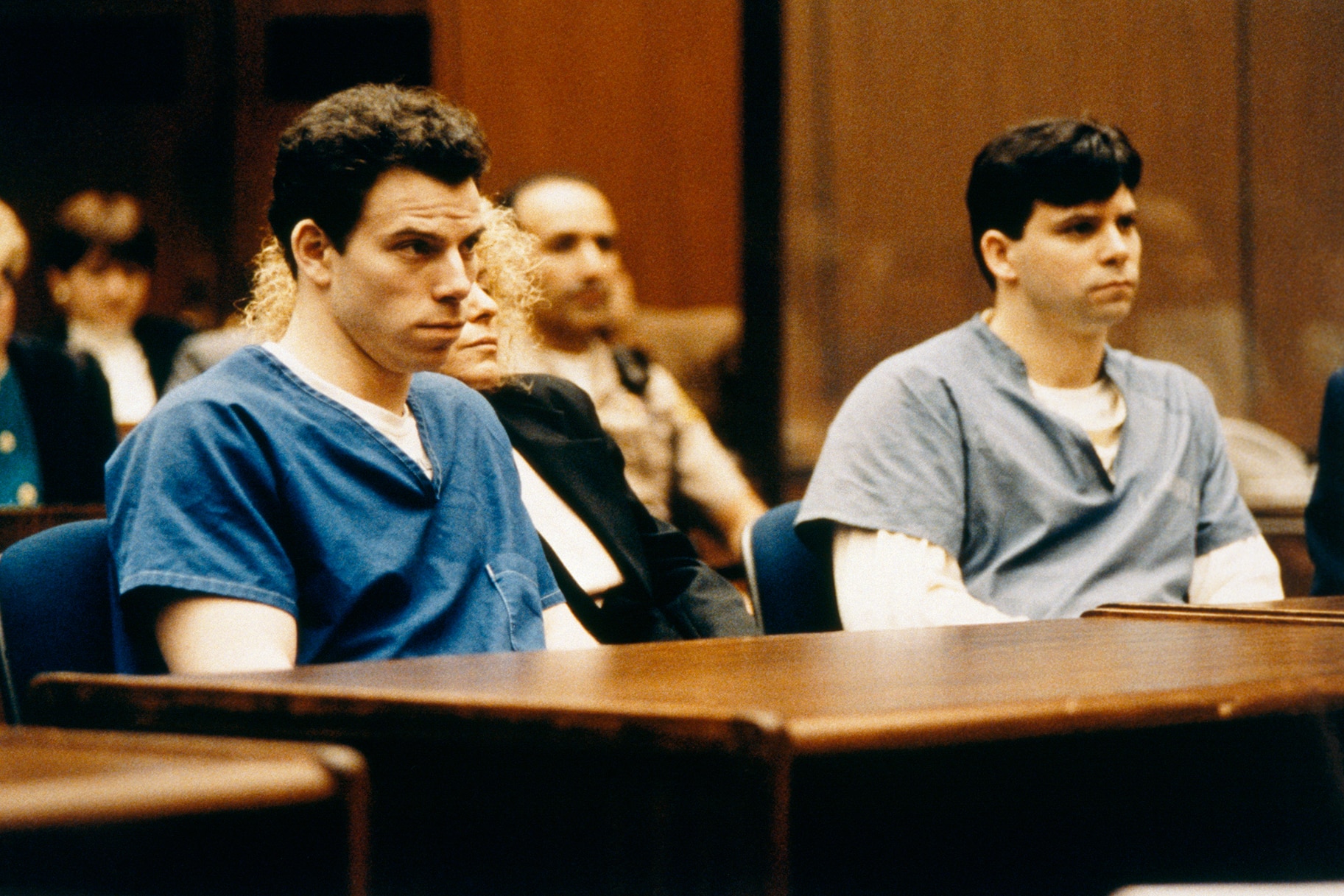Create a free profile to get unlimited access to exclusive videos, breaking news, sweepstakes, and more!
Why The Case Of The Menendez Brothers Stunned A Nation
“The parents were as much on trial as Lyle and Erik Menendez were on trial and why the prosecution tried to stick to a just the facts ma'm narrative. The defense strategy was emotion, emotion, emotion, emotion," a former Los Angeles Times reporter said of the sensational nature of the case.

“Someone killed my parents,” a hysterical Lyle Menendenz wailed to a 911 dispatcher on August 20, 1989.
Beverly Hills police rushed to the six-bedroom Mediterranean-style mansion where they found Jose Menendenz bleeding out, his blood soaking the family’s white couch.
“It was eerily quiet and when I went into the den/library, the first thing I noticed was Jose Menendez seated on the couch,” Detective Les Zoeller told “Dateline: Secrets Uncovered,” airing Wednesdays at 8/7c on Oxygen. “He was slumped to one side, his head was to one side. I could immediately tell that his face was disfigured from the shotgun blast he took to the side of his head.”
Jose’s wife, Mary Louise Menendez — who was more commonly known as Kitty — was curled into a fetal position on the floor near his feet. She had taken a shot gun blast to the face, along with several shotgun wounds to the knee.
“There was a contact wound on Kitty Menendez’s face, it blew out her eye,” prosecuting attorney Pamela Bozanich said. “I mean it was grotesque what happened to her.”
The couple’s two sons, Lyle and Erik, told police they had arrived home after a movie to the grisly discovery as smoke from the gunshots still loomed in the air. But as the months passed after the execution-style deaths, police were struck by the sons’ lavish spending sprees: buying Rolex watches, private tennis lessons, expensive clothing, jewelry, a Porsche, and even a chicken wings restaurant.
“They were just spending, spending, spending,” Zoeller told "Dateline" correspondent Keith Morrison.
The evidence would eventually lead back to the brothers themselves in a case that shocked the nation. The sensational 1993 trial helped define the relatively new cable network Court TV, and while, by then, Lyle and Erik had admitted to being the killers, they claimed to have snapped after enduring years of physical and sexual abuse from their father.
The case polarized the nation — and the jury — as an argument broke out about whether the brothers were cold-blooded killers or traumatized victims.
“You weren’t just playing to the jury, you were playing to all of America,” former Los Angeles Times reporter Alan Abrahamson said of the sensational nature of the case.
Jose Menendez was seemingly living the American dream when the successful executive was shot to death.
As a teenager, he had fled communist Cuba to find a better life, marrying Kitty in 1963.
The couple had two sons, Lyle and Erik, and by all accounts Jose found success in the business world through his own ruthless drive and determination, serving as general manager of Hertz and later as an executive in a Hollywood film company.
“They were stars in our family,” Kitty’s niece Diane Hernandez said of the family’s success.
The Menendez family moved into that Beverly Hills mansion — once owned by Elton John and music star Prince — cementing their place as Hollywood elite.
Those who knew the family said Jose’s need to succeed extended to his sons, who he pushed to achieve on the tennis court, soccer field, and in the pool, often to an extreme.
Lyle headed to Princeton and Erik was planning to start at UCLA in the fall, but the family’s image of perfection would come crashing down on August 20, 1989, when both Kitty and Jose were gunned down in their home.
While investigators first suspected the brutal deaths may have been a mob hit or linked to Jose’s business dealings, they soon turned their attention to the couple’s sons. Within just days of the deaths, Lyle and Erik went to the family’s bank to try to get their hands on their parents’ will.
With their parents’ money at their disposal, they went on a lavish spending spree.
Although both men “willingly” answered police questions, Zoeller said police started to suspect the brothers after they learned about a screenplay Erik had written about a man who killed his parents to inherit $157 million.
They also questioned the brothers’ story about finding their parents, including that odd detail about seeing gun smoke in the air. Zoeller noted that the smoke would have dissipated quickly and wouldn’t have been left in the air if they had really arrived minutes after the shooting.
Investigators also got an unusual call from a woman named Judalon Smyth, who had been having an affair with Erik’s psychologist Jerome Oziel. She claimed to have overheard Erik confessing to the crime one day in the office and said Oziel later taped confessions of the brothers describing the dark deed.
Police immediately seized the tape, but they weren’t able to listen to it because of client-doctor privileges.
Yet it was enough to make an arrest on May 8, 1990.
As investigators continued to comb through the case, they also found evidence suggesting the brothers had purchased shotguns two days before the murder with a stolen ID Lyle had taken from a Princeton classmate.
Prosecutors had built a strong case against the Menendez brothers, but the defense team would turn the case upside down when they claimed the brothers had carried out the killings after years of abuse, relying on an “imperfect self-defense” law, which argued that the brothers had an honest but unreasonable belief that their life was in danger.
Neighbors, coaches, family members, and friends would all take the stand in the televised trial to paint a portrait of Jose as a demanding and abusive father, who had a strict rule in his household that no one was allowed to go down the hall of their home if he was behind closed doors with his sons.
But it was the boys' own graphic testimony about the sexual abuse they said they endured by their father — as their mother turned a blind eye — that became the crux of the defense.
“We would be in the bathroom, and uh, he would put me on my knees and .. uh, have oral sex with him,” a tearful Lyle testified of abuse he said he suffered from ages of 6 to 8. “He raped me.”
Lyle said the sexual abuse stopped when he was 8 years old and that he never realized his father had turned his focus to younger brother Erik until years later.
Erik also took the stand to describe his disturbing account of the alleged abuse.
“He would have me give him oral sex and he would stick the needles or tacks into my thighs as he was doing this,” he said, adding that if he refused his father would come back with a knife and threaten him.
Lyle testified that just days before the fatal shootings he had confronted his father about the abuse and believed that his father might kill him to keep the family’s secrets hidden.
Once the brothers used their mental state as a defense, it opened the door for the confession tape from their psychologist to be played in court.
“The parents were as much on trial as Lyle and Erik Menendez were on trial and why the prosecution tried to stick to a just the facts ma'am narrative, the defense strategy was emotion, emotion, emotion, emotion," Abrahamson said.
Prosecutors questioned the sexual abuse claims and pointed to the savage nature of the crime and the millions the brothers stand to inherit with their parents out of the way
After intense deliberations, a judge announced that the jury was hopelessly deadlocked.
The case would be retried in 1995 but this time no TV cameras were allowed. Lyle also didn’t take the stand after letters surfaced suggesting he had encouraged people to lie for the defense in his initial trial. The judge also reduce the amount of testimony allowed about the alleged physical and sexual abuse. But, perhaps most importantly, the judge ruled that this time jurors could not consider the imperfect self-defense strategy after a state supreme court ruling in another case.
This time the jury found the brothers guilty on all counts and they were sentenced to life in prison.
At 49 years old, Lyle agreed to speak with “Dateline” from prison, saying he had become enraged to learn his father was allegedly abusing Erik, after he had remained mum about his own abuse for years.
“It was like I kept my part of that sort of devil’s pact and [my father] didn’t,” he said. “And my mother, you know, 'You let your children wake up in the home of a child molester every day.’”
He insisted he and Erik had never made the conscious decision to kill their parents that day and said they had bought the weapons because they knew their father would never let them expose the family’s darkest secrets.
“We didn’t decide to do it,” Lyle said. “We finally just kind of got overwhelmed with this panic and emotion and made the decision to run in that room.”
For more on this case and others like it, watch "Dateline: Secrets Uncovered," airing Wednesdays at 8/7c on Oxygen, or stream episodes here.





























